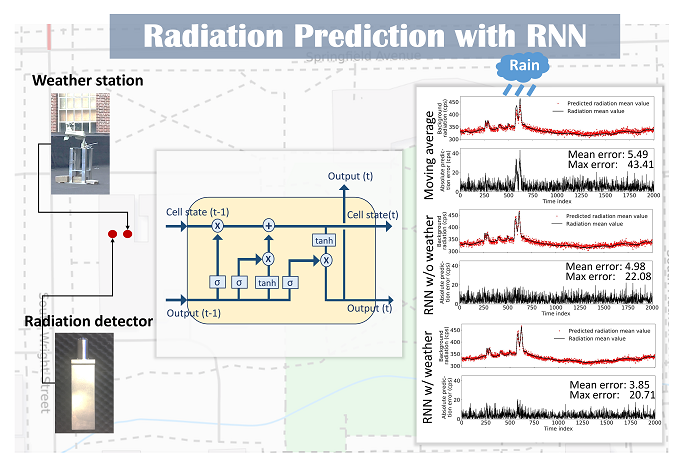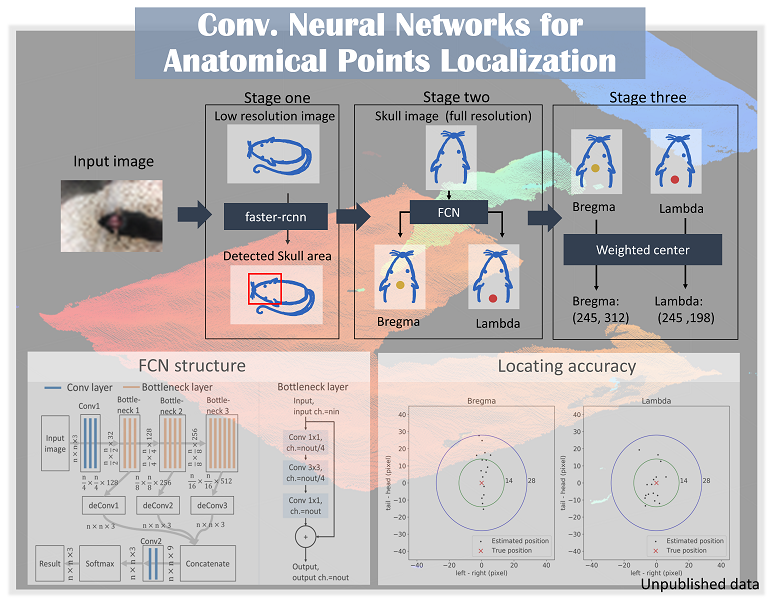Projects

Prediction of weather induced background radiation fluctuation with recurrent neural networks.
It has been long observed that temporal fluctuations of background radiation are positively correlated with precipitation due to the scavenging effect of rain and snow. Accurately estimating the temporal fluctuation of background radiation helps anomalous radiation source detection to reduce false alarm rates and improve estimation accuracy. In this research, we have applied recurrent neural networks to predict the background radiation level based on past weather and radiation data. Two datasets are prepared with different noise levels. Experiment results show that for the noisy dataset, recurrent neural networks outperform the traditional moving average algorithm; for the clean dataset, recurrent neural networks perform as well as the moving average algorithm. [Paper]

Automated location detection of injection site for preclinical stereotactic neurosurgery through fully convolutional networks.
Currently, injection sites of probes, cannula, and optic fibers in stereotactic neurosurgery are typically located manually. This step involves location estimations based on human experiences and thus introduces errors. In order to reduce location error and improve the repeatability of experiments and treatments, we have developed an automated locating framework to locating injection sites. This framework integrates a regional convolutional network and a fully convolutional network to locate specific anatomical points on skulls of rodents. Experiment results show that the proposed locating framework is capable to identify and locate Bregma and Lambda points (two important anatomical reference points) in rodent skull images with mean errors less than 500 um. This method is robust to different lighting conditions and mouse orientations and has the potential to simplify the procedure of locating injection sites. [poster]

Spatial-temporal modeling of background radiation using mobile sensor networks
Modeling of background radiation for the urban environment plays an important role in homeland security. However, background radiation is difficult to assess due to its spatial-temporal fluctuations caused by variations in soil composition, building materials, and weather patterns etc. To address the challenge of background radiation modeling, we have developed a mobile sensor network to continuously monitor the background radiation; we have also proposed a maximum likelihood estimation algorithm to decouple and estimate the background's spatial distribution and temporal fluctuation. Experiment results demonstrate that this background radiation monitoring system accurately recognizes high background regions in the experiment area and successfully captures temporal fluctuation trends of background radiation during rains. Our system provides an efficient solution to model the temporal fluctuation and spatial distribution of background radiation. [paper]

Reinforcement learning for Radiation Source Detection
Anomalous radiation source detection in an urban environment is challenging due to the complex nature of background radiation. When a suspicious area is determined, a radiation survey is usually carried out to search for anomalous radiation sources. However, current survey strategies either require human efforts or are not efficient and flexible enough to adjust survey paths based on recent measurements. Reinforcement learning, which studies the problem of how agents ought to take the optimized action so that a goal can be achieved efficiently, provides an alternative data-driven solution to conduct radiation detection tasks with no human intervention. In this research, we have applied reinforcement learning to navigate an automated agent searching for radiation sources. A simulated radiation environment is constructed, and Q-learning approaches are applied. Preliminary results show that Q-learning is able to navigate the agent to search for radiation sources efficiently. [poster][paper]